Editor’s Note: This is the ninth chapter of Alfred the Great, by Jacob Abbot (published 1872).
(Continued from Part 8)
IX. Reassembling of the Army
Athelney, though its precise locality cannot now be certainly ascertained, was in the southwestern part of England, in Somersetshire, which county lies on the southern shore of the Bristol Channel. There is a region of marshes in that vicinity, which tradition assigns as the place of Alfred’s retreat; and there was, about the middle of this century, a farm-house there, which bore the name of Athelney, though this name may have been given to it in modern times by those who imagined it to be the ancient locality. A jewel of gold, engraved as an amulet to be worn about the neck, and inscribed with the Saxon words which mean “Alfred had me made,” was found in the vicinity, and is still carefully preserved in a museum in England. Some curious antiquarians profess to find the very hillock, rising out of the low grounds around, where the herdsman that entertained Alfred so long lived; but this, of course, is all uncertain. The peculiarities of the spot derived their character from the morasses, and the woods, and the courses of the sluggish streams in the neighborhood, and these are elements of landscape scenery which ten centuries of time and of cultivation would entirely change.
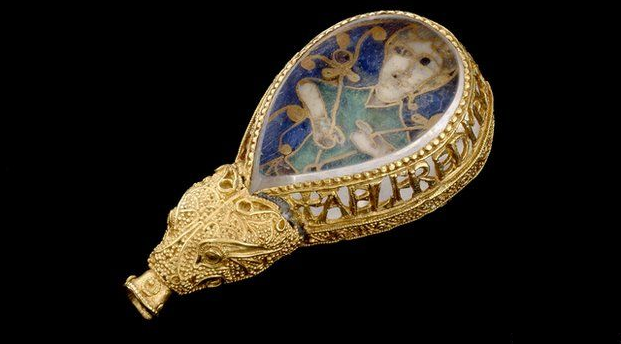
Whatever may have been the precise situation of the spot, instead of being, as at first, a mere hiding-place and retreat, it became, before many months, as was intimated in the last chapter, a military camp, secluded and concealed, it is true, but still possessing, in a considerable degree, the characteristics of a fastness and place of defense. Alfred’s company erected something which might be called a wall. They built a bridge across the water where the herdsman’s boat had been accustomed to ply. They raised two towers to watch and guard the bridge. All these defenses were indeed of a very rude and simple construction; still, they answered the purpose intended. They afforded a real protection; and, more than all, they produced a certain moral effect upon the minds of these whom they shielded, by enabling them to consider themselves as no longer lurking fugitives, dependent for safety on simple concealment, but as a garrison, weak, it is true, but still gathering strength, and advancing gradually toward a condition which would enable them to make positive aggressions upon the enemy.
The circumstance which occurred to hasten the development of Alfred’s plans, and which was briefly alluded to at the close of the last chapter, was the following: It seems that quite a large party of Danes, under the command of a leader named Hubba, had been making a tour of conquest and plunder in Wales; which country was on the other side of the Bristol Channel, directly north of Athelney, where Alfred was beginning to concentrate a force. He would be immediately exposed to an attack from this quarter as soon as it should be known that he was at Athelney, as the distance across the Channel was not great, and the Danes were provided with shipping.
Athelney was in the county called Somersetshire. To the southwest of Somersetshire, a little below it, on the shores of the Bristol Channel, was a castle, called Castle Kenwith, in Devonshire. The Duke of Devonshire, who held this castle, encouraged by Alfred’s preparations for action, had assembled a considerable force here to be ready to co-operate with Alfred in the active measures which he was about to adopt. Things being in this state, Hubba brought down his forces to the northern shores of the Channel, collected together all the boats and shipping that he could command, crossed the Channel, and landed on the Devonshire shore. Odun, the duke, not being strong enough to resist, fled, and shut himself up, with all his men, in the castle. Hubba advanced to the castle walls, and sitting down before them, began to consider what to do.
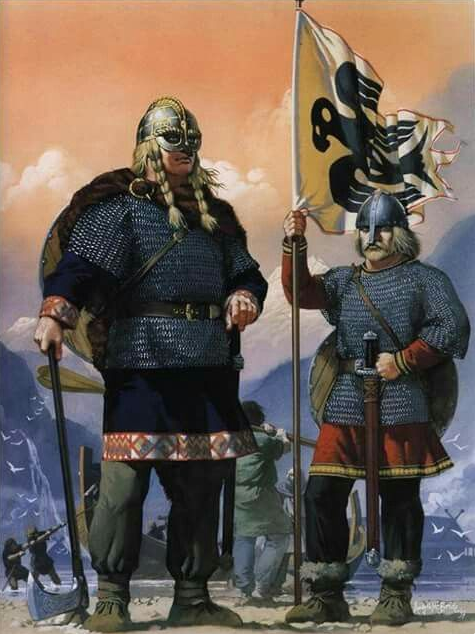
Hubba was the last surviving son of Ragner Lodbrog, whose deeds and adventures were related in a former chapter. He was, like all other chieftains among the Danes, a man of great determination and energy, and he had made himself very celebrated all over the land by his exploits and conquests. His particular horde of marauders, too, was specially celebrated among all the others, on account of a mysterious and magical banner which they bore. The name of this banner was the Reafan, that is, the Raven. There was the figure of a raven woven or embroidered on the banner. Hubba’s three sisters had woven it for their brothers, when they went forth across the German Ocean to avenge their father’s death. It possessed, as both the Danes and Saxons believed, supernatural and magical powers. The raven on the banner could foresee the result of any battle into which it was borne. It remained lifeless and at rest whenever the result was to be adverse; and, on the other hand, it fluttered its wings with a mysterious and magical vitality when they who bore it were destined to victory. The Danes consequently looked up to this banner with a feeling of profound veneration and awe, and the Saxons feared and dreaded its mysterious power. The explanation of this pretended miracle is easy. The imagination of superstitious men, in such a state of society as that of these half-savage Danes, is capable of much greater triumphs over the reason and the senses than is implied in making them believe that the wings of a bird are either in motion or at rest, whichever it fancies, when the banner on which the image is embroidered is advancing to the field and fluttering in the breeze.
The Castle of Kenwith was situated on a rocky promontory, and was defended by a Saxon wall. Hubba saw that it would be difficult to carry it by a direct assault. On the other hand, it was not well supplied with water or provisions, and the numerous multitude which had crowded into it, would, as Hubba thought, be speedily compelled to surrender by thirst and famine, if he were simply to wait a short time, till their scanty stock of food was consumed. Perhaps the raven did not flutter her wings when Hubba approached the castle, but by her apparent lifelessness portended calamity if an attack were to be made. At all events, Hubba decided not to attack the castle, but to invest it closely on all sides, with his army on the land and with his vessels on the side of the sea, and thus reduce it by famine. He accordingly stationed his troops and his galleys at their posts, and established himself in his tent, quietly to await the result.
He did not have to wait so long as he anticipated. Odun, finding that his danger was so imminent, nay, that his destruction was inevitable if he remained in his castle, thus shut in, determined, in the desperation to which the emergency reduced him, to make a sally. Accordingly, one night, as soon as it was dark, so that the indications of any movement within the castle might not be perceived by the sentinels and watchmen in Hubba’s lines, he began to marshal and organize his army for a sudden and furious onset upon the camp of the Danes.
They waited, when all was ready, till the first break of day. To make the surprise most effectual, it was necessary that it should take place in the night; but then, on the other hand, the success, if they should be successful, would require, in order to be followed up with advantage, the light of day. Odun chose, therefore, the earliest dawn as the time for his attempt, as this was the only period which would give him at first darkness for his surprise, and afterward light for his victory. The time was well chosen, the arrangements were all well made, and the result corresponded with the character of the preparations. The sally was triumphantly successful.
The Danes, who were all, except their sentinels, sleeping quietly and secure, were suddenly aroused by the unearthly and terrific yells with which the Saxons burst into the lines of their encampment. They flew to arms, but the shock of the onset produced a panic and confusion which soon made their cause hopeless. Odun and his immediate followers pressed directly forward into Hubba’s tent where they surprised the commander, and massacred him on the spot. They seized, too, to their inexpressible joy, the sacred banner, which was in Hubba’s tent, and bore it forth, rejoicing in it, not merely as a splendid trophy of their victory, but as a loss to their enemies which fixed and sealed their doom.
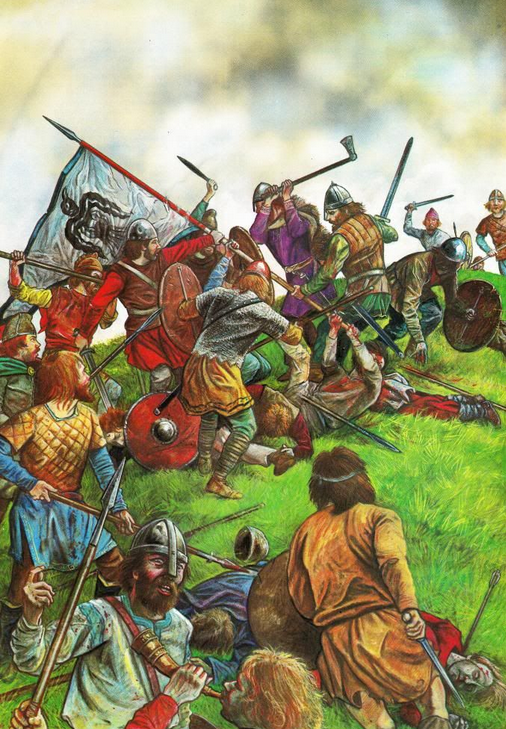
The Danes fled before their enemies in terror, and the consternation which they felt, when they learned that their banner had been captured and their leader slain, was soon changed into absolute despair. The Saxons slew them without mercy, cutting down some as they were running before them in their headlong flight, and transfixing others with their spears and arrows as they lay upon the ground, trampled down by the crowds and the confusion. There was no place of refuge to which they could fly except to their ships. Those, therefore, that escaped the weapons of their pursuers, fled in the direction of the water, where the strong and the fortunate gained the boats and the galleys, while the exhausted and the wounded were drowned. The fleet sailed away from the coast, and the Saxons, on surveying the scene of the terrible contest, estimated that there were twelve hundred dead bodies lying in the field.
This victory, and especially the capture of the Raven, produced vast effects on the minds both of the Saxons and of the Danes, animating and encouraging the one, and depressing the other with superstitious as well as natural and proper fears. The influence of the battle was sufficient, in fact, wholly to change Alfred’s position and prospects. The news of the discovery of the place of his retreat, and of the measures which he was maturing for taking the fields again to meet his enemies, spread throughout the country. The people were everywhere ready to take up arms and join him. There were large bodies of Danes in several parts of his dominions still, and they, alarmed somewhat at these indications of new efforts of resistance on the part of their enemies, began to concentrate their strength and prepare for another struggle.
The main body of the Danes were encamped at a place called Edendune, in Wiltshire. There is a hill near, which the army made their main position, and the marks of their fortifications have been traced there, either in imagination or reality, in modern times. Alfred wished to gain more precise and accurate information than he yet possessed of the numbers and situation of his foes; and, in order to do this, instead of employing a spy, he conceived the design of going himself in disguise to explore the camp of the Danes. The undertaking was full of danger, but yet not quite so desperate as at first it might seem. Alfred had had abundant opportunities during the months of his seclusion to become familiar with the modes of speech and the manners of peasant life. He had also, in his early years, stored his memory with Saxon poetry, as has already been stated. He was fond of music, too, and well skilled in it; so that he had every qualification for assuming the character of one of those roving harpers, who, in those days, followed armies, to sing songs and make amusement for the soldiers. He determined, consequently, to assume the disguise of a harper, and to wander into the camp of the Danes, that he might make his own observations on the nature and magnitude of the force with which he was about to contend.
He accordingly clothed himself in the garb of the character which he was to assume, and, taking his harp upon his shoulder, wandered away in the direction of the Northmen’s camp. Such a strolling countryman, half musician, half beggar, would enter without suspicion or hindrance into the camp, even though he belonged to the nation of the enemy. Alfred was readily admitted, and he wandered at will about the lines, to play and sing to the soldiers wherever he found groups to listen—intent, apparently, on nothing but his scanty pittance of pay, while he was really studying, with the utmost attention and care, the number, and disposition, and discipline of the troops, and all the arrangements of the army. He came very near discovering himself, however, by overacting his part. His music was so well executed and his ballads were so fine, that reports of the excellence of his performance reached the commander’s ears. He ordered the pretended harper to be sent into his tent, that he might hear him play and sing. Alfred went, and, thus he had the opportunity of completing his observations in the tent, and in the presence of the Danish king.
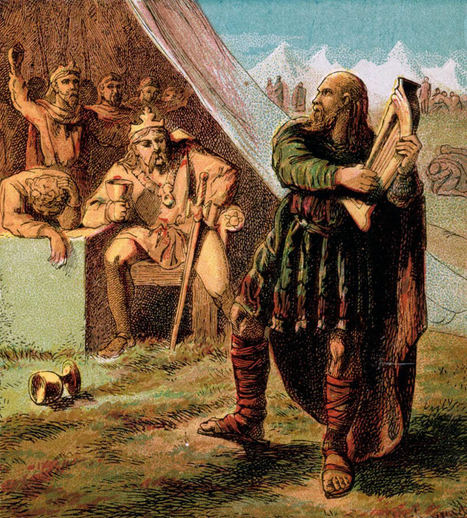
Alfred found that the Danish camp was in a very unguarded and careless condition. The name of the commander, or king, was Guthrum. Alfred, while playing in his presence, studied his character, and it is improbable that the very extraordinary course which he afterward pursued in respect to Guthrum may have been caused, in a great degree, by the opportunity he now enjoyed of domestic access to him and of obtaining a near and intimate view of his social and personal character. Guthrum treated the supposed harper with great kindness. He was much pleased both with his singing and his songs, being attracted, too, probably, in some degree, by a certain mysterious interest which the humble stranger must have inspired; for Alfred possessed personal and intellectual traits of character which could not but have given to his conversation and his manners a certain charm, notwithstanding all his efforts to disguise or conceal them.
However this may be, Guthrum gave Alfred a very friendly reception, and the hour of social intercourse and enjoyment which the general and the ballad-singer spent together was only a precursor of the more solid and honest friendship which afterward subsisted between them as allied sovereigns.
Alfred had one person with him, whom he had brought from Athelney—a sort of attendant—to help him carry his harp, and to be a companion for him on the way. He would have needed such a companion even if he had been only what he seemed; but for a spy, going in disguise into the camp of such ferocious enemies as the Danes, it would seem absolutely indispensable that he should have the support and sympathy of a friend.
Alfred, after finishing his examination of the camp of Guthrum, and forming secretly, in his own mind, his plans for attacking it, moved leisurely away, taking his harp and his attendant with him, as if going on in search of some new place to practice his profession. As soon as he was out of the reach of observation, he made a circuit and returned in safety to Athelney. The season was now spring, and everything favored the commencement of his enterprise.
His first measure was to send out some trusty messengers into all the neighboring counties, to visit and confer with his friends at their various castles and strong-holds. These messengers were to announce to such Saxon leaders as they should find that Alfred was still alive, and that he was preparing to take the field against the Danes again; and were to invite them to assemble at a certain place appointed, in a forest, with as many followers as they could bring, that the king might there complete the organization of an army, and hold consultation with them to mature their plans
The wood on the borders of which they were to meet was an extensive forest of willows, fifteen miles long, and six broad. It was known by the name of Selwood Forest. There was a celebrated place called the Stone of Egbert, where the meeting was to be held. Each chieftain whom the messengers should visit was to be invited to come to the Stone of Egbert at the appointed day, with as many armed men, and yet in as secret and noiseless a manner possible, so as thus, while concentrating all their forces in preparation for their intended attack, to avoid everything which would tend to put Guthrum on his guard.
The messengers found the Saxon chieftains very ready to enter into Alfred’s plans. They were rejoiced to hear, as some of them did now for the first time hear, that he was alive, and that the spirit and energy of his former character were about to be exhibited again. Everything, in fact, conspired to favor the enterprise. The long and gloomy months of winter were past, and the opening spring brought with it, as usual, excitement and readiness for action. The tidings of Odun’s victory over Hubba, and the capture of the sacred raven, which had spread everywhere, had awakened a general enthusiasm, and a desire on the part of all the Saxon chieftains and soldiers to try their strength once more with their ancient enemies.
Accordingly, those to whom the secret was entrusted eagerly accepted the invitation, or, perhaps, as it should rather be expressed, obeyed the summons which Alfred sent them. They marshaled their forces without any delay; and repaired to the appointed place in Selwood Forest. Alfred was ready to meet them there. Two days were occupied with the arrivals of the different parties, and in the mutual congratulations and rejoicings. Growing more bold as their sense of strength increased with their increasing numbers, and with the ardor and enthusiasm which their mutual influence on each other inspired, they spent the intervals of their consultations in festivities and rejoicings, celebrating the occasion with games and martial music. The forest resounded with the blasts of horns, the sound of the trumpets, the clash of arms, and the shouts of joy and congratulation, which all the efforts of the more prudent and cautious could not repress.
In the meantime, Guthrum remained in his encampment at Edendune. This seems to have been the principal concentration of the forces of the Danes which were marshaled for military service; and yet there were large numbers of the people, disbanded soldiers, or non-combatants, who had come over in the train of the armies, that had taken possession of the lands which they had conquered, and had settled upon them for cultivation, as if to make them their permanent home. These intruders were scattered in larger or smaller bodies in various parts of the kingdom, the Saxon inhabitants being prevented from driving them away by the influence and power of the armies, which still kept possession of the field, and preserved their military organization complete, ready for action at any time whenever any organized Saxon force should appear.
Guthrum, as we have said, headed the largest of these armies. He was aware of the increasing excitement that was spreading among the Saxon population, and he even heard rumors of the movements which the bodies of Saxons made, in going under their several chieftains to Selwood Forest. He expected that some important movement was about to occur, but he had no idea that preparations so extended, and for so decisive a demonstration, were so far advanced. He remained, therefore, at his camp at Edendune, gradually completing his arrangements for his summer campaign, but making no preparations for resisting any sudden or violent attack.
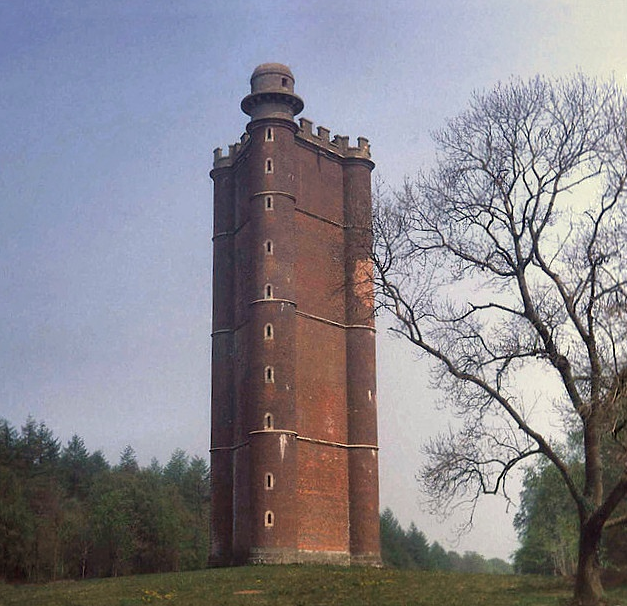
When all was ready, Alfred put himself at the head of the forces which had collected at the Egbert Stone, or, as it is quaintly spelled in some of the old accounts, Ecgbyrth-stan: There is a place called Brixstan in that vicinity now, which may possibly be the same name modified and abridged by the lapse of time. Alfred moved forward toward Guthrum’s camp. He went only a part of the way the first day, intending to finish the march by getting into the immediate vicinity of the enemy on the morrow. He succeeded in accomplishing this object, and encamped the next night at a place called Æcglea, on an eminence from which he could reconnoiter, from a great distance, the position of the army.
That night, as he was sleeping in his tent, he had a remarkable dream. He dreamed that his relative, St. Neot, who has been already mentioned as the chaplain or priest who reproved him so severely for his sins in the early part of his reign, appeared to him. The apparition bid him not fear the immense army of pagans whom he was going to encounter on the morrow. God, he said, had accepted his penitence, and was now about to take him under his special protection. The calamities which had befallen him were sent in judgment to punish the pride and arrogance which he had manifested in the early part of his reign; but his faults had been expiated by the sufferings he had endured, and by the penitence and the piety which they had been the means of awakening in his heart; and now he might go forward into the battle without fear, as God was about to give him the victory over all his enemies.
The king related his dream the next morning to his army. The enthusiasm and ardor which the chieftains and the men had felt before were very much increased by this assurance of success. They broke up their encampment, therefore, and commenced the march, which was to bring them, before many hours, into the presence of the enemy, with great alacrity, and eager expectations of success.
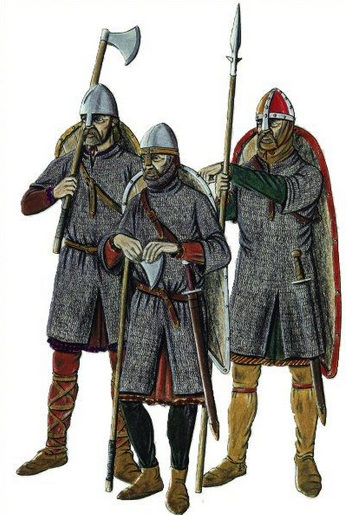
(Continue to Part 10)

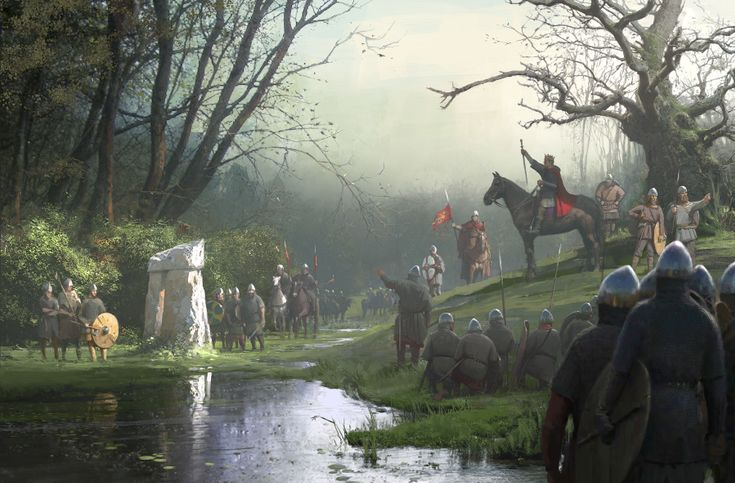


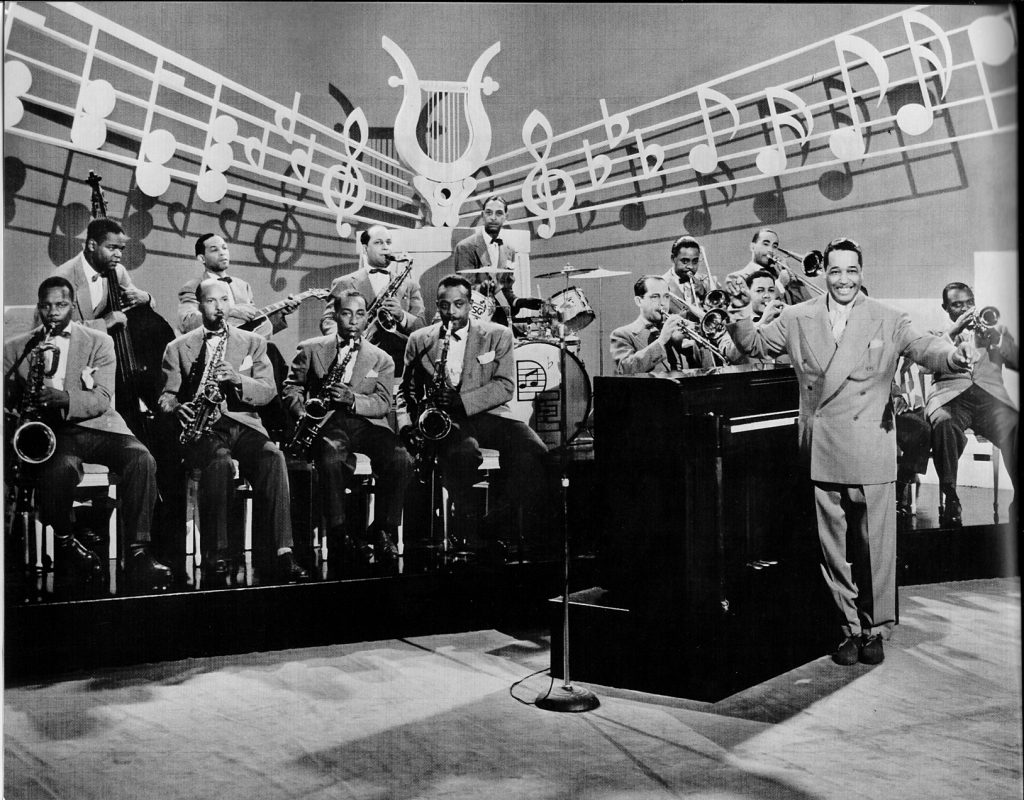





[…] Source link […]
[…] Read Part 9 here […]